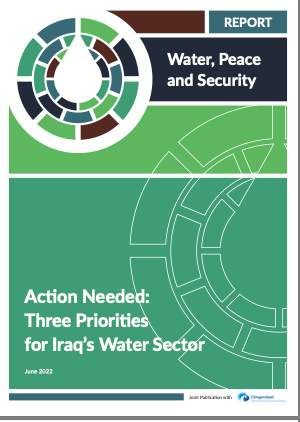Three Priorities For Iraq’s Water Sector
New Opportunities For The New Government
3 Jul 2022 by The Water Diplomat
THE HAGUE, Netherlands

On the 14th of June, the Water Peace and Security Partnership published a report on Iraq’s water sector which makes the case for three priorities in Iraq’s water sector.
With the election of a new parliament and the formation of a new government, the researchers argue, some opportunities are being opened to develop new policies and initiatives in the water sector.
Iraq’s water resources have faced enormous pressures over the past decades, and in 2021 the country experienced its second driest season in 40 years due to a record drought. In addition, over the last 40 years, water inflows from the Tigris and Euphrates rivers which are the main source of water for the country have decreased by 30-40%.
The Water Diplomat reported in April that agriculture is the main source of livelihood for more than 25% of the population, that strong declines in food production have been witnessed last year and that there has been an increase in rural-urban migration, with 1 million people internally displaced.
More than 90 of Iraq’s freshwater supply is sourced from the Euphrates and Tigris Rivers, but since the 1970’s, upstream riparian countries Turkey, Syria and Iran have developed large water infrastructure projects, reducing the inflow of water into Iraq.
With the exception of two provisional bilateral water allocation agreements, there are no existing treaties or institutions which could lead to binding agreements over the shared water resources. In this context, the authors argue that it is important first of all for Iraq to keep water diplomacy channels with Turkey and Iraq open. There are options for cooperation available such as cooperation on climate adaptation and joint emergency response mechanisms which may be easier to achieve in the short term than comprehensive water sharing agreements.
Secondly, the authors argue that developing a comprehensive national response to water pollution could improve water security. Declining water quality has become a major challenge through the discharge of insufficiently treated wastewater, poor waste management, polluted agricultural runoff, and increased salinity. A combined approach is required that integrates issues with infrastructure, water quality monitoring, law enforcement, and public awareness.
Thirdly, there are opportunities to increase water use efficiency. Agriculture accounts for 91% of national water use and yet water use in agriculture is inefficient, with flood irrigation techniques dominating the sector. Similarly, oil production is a water intensive sector and contributes to water pollution due to the discharge of industrial wastewater into the environment.
The authors conclude that meaningful opportunities exist to address water insecurity in Iraq, but that this requires swift action from the national government in collaboration with local actors.
